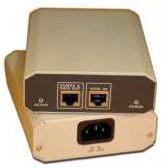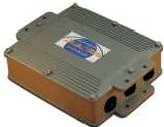Radio module vendor launches “open” WAP line
Mar 13, 2006 — by LinuxDevices Staff — from the LinuxDevices Archive — 1 views A radio module vendor in Italy has launched a line of wireless access points (WAPs) and other infrastructure equipment based on what it calls a “completely open carrier class integrated platform.” Essentia's “Wifless” line comprises surveillance equipment, as well as carrier, enterprise, and military access equipment –… all running embedded Linux.
A radio module vendor in Italy has launched a line of wireless access points (WAPs) and other infrastructure equipment based on what it calls a “completely open carrier class integrated platform.” Essentia's “Wifless” line comprises surveillance equipment, as well as carrier, enterprise, and military access equipment –… all running embedded Linux.
Essentia's Wifless products are distributed pre-loaded with the company's “PEK OS,” an embedded Linux implementation based on a 2.4.17 kernel. However, their “true open” nature allows users to install other embedded Linux OSes, such as TimeSys or MontaVista, the company says. Users could even install non-Linux OSes, such as VxWorks or Windows CE, according to the company.



Essentia's Wifless products come with an embedded 2.4.17 Linux kernel
The Wifless line will eventually include WiMAX and PON (passive optical network) devices. Currently, however, only “ESS” (enhanced spread spectrum) wireless devices are available.
The Wifless ESS devices appear to run PEK OS on an Intel IXP425 NPU (network processor unit). They integrate Essentia's “Advasu” radio modules and antennas, which are based on Intersil and Atheros chipsets, and operate on standard 2.4GHz ISM (industrial, scientific, and medical) frequency bands. Essentia will supply driver source code to qualified customers, it says.
Essentia says that users can tune the Wifless ESS devices according to their specific performance requirements. Company spokesperson Laura Ansaloni said, “The Wifless ESS 24xx2 wireless equipment [offer] the full flexibility and features set delivered by the Linux Embedded OS.”
This article was originally published on LinuxDevices.com and has been donated to the open source community by QuinStreet Inc. Please visit LinuxToday.com for up-to-date news and articles about Linux and open source.
